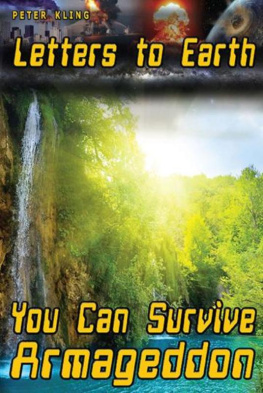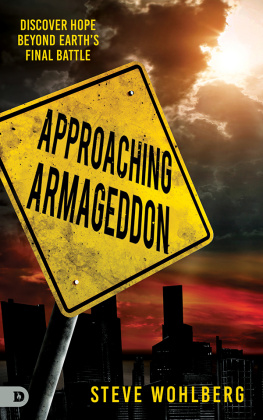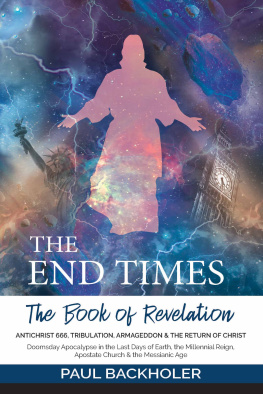CHAPTER 1
HOW DID WE GET HERE?
A few years ago we entered a new millennium. Y2K never happened, the planets aligned and the end of the world did not come. We lived through 9/11 and the world lost a little more innocence. It was now apparent that terrorism was going to be part of our lives, not just something that we heard about in the news. With all of this, our lives became busier and a bit more complicated, but nonetheless, life finds a way and moves on.
When we reflect on the last 100 years, we can plainly see that as a people we have accomplished many amazing things. Take the history of flight: 100 years ago, we could hardly fly 100 feet, and by the end of the 1960s we put a man on the moon. Now we have developed aircraft that fly far beyond the speed of sound and are invisible to radar, aircraft that can touch space itself and return to Earth safely.
We have seen advances in technology in every corner of our lives. In fact, we would be very hard pressed to find a part of our lives that technology does not affect in some way. Science has opened vast volumes of knowledge to us in every discipline under the stars, from the start of life on Earth to the unbelievable vastness of space. Science has attained the ability to clone life and even DNA has given up its secrets to us. We have mapped the human genome. We have wiped out diseases, extended the human life expectancy and for the most part have improved the quality of life for most people on the planet. We are in fact genetically engineering the world around us, from advanced medicines right down to the food we eat. We do our best to cure the sick and feed the hungry. In fact, it is said that the United States grows enough food every year to feed the worlds population.
Computers have changed our lives in many different ways. Not a day goes by that we do not interact with a computer in some way. Computers have done something amazing for the world. Never since the fabled days of the Tower of Babel has the world started to speak one language again. Now, through the world of technology, we can communicate with almost anyone on our planet at any time. Communication has become a driving force in our lives. Look at cellular phone communication: this was just an infant industry in the 1980s. Cellular or mobile phones were only reserved for the rich or executives of companies. Today you can enter any city in the world and it looks like everyone, from children to grandparents, all have their own cell phone and everyone is talking to everyone else. Something that most people never had a few years ago is now a necessity of life. We communicate not just within our own circle of friends, but we communicate with people around the world, and we do so on a daily basis. Our world has become much smaller, and language is no longer the barrier it once was.
Yes, there is no doubt that we push back the frontier of science a little more every day and become more knowledgeable of our world and the universe. As they study the stars and the universe around us, astronomers are finding that there are what seem to be endless galaxies in the never-ending expanse we call the universe. In fact, it is said that there are more stars in the universe than there are grains of sand on every beach and every desert on the Earth. What is more is that we are finding that many stars have planets orbiting them. It is believed that before long we will find planets, like our Earth, that are capable of supporting life. On the darker side of things, they have also found rogue asteroids and it is believed that it is only a matter of time before an asteroid of considerable size hits our Earth and forever changes our lives, or the lives of the survivors, if there are any. Because of this possibility, governments are spending millions of dollars for scientists to come up with a solution to address this problem.
There is no doubt that science and technology have become a part of our everyday lives, and without their benefits, most peoples lives would be very difficult and very inconvenient to say the least. Still, with all the advancements that we have seen over the past 100 years, we are no closer to answering the basic questions of life, such as Why are we here? and Where did we come from and where are we going? Does God exist? If he does exist, does he even care about us? Many people have thought about questions like these many times in their lives but still have no hard answers. What is worse is that religion, which is supposed to represent God, has no answers either. It is all a mystery to religious leaders, or they invent things that sound good to their parishioners. How can they really offer any help to those who look to them for the answers to lifes questions? Still, science seems to be more reliable than religion. Science looks for the pure answer to the question and deals with facts as they are understood. Therefore, when science examines the accepted clues to our origins, the fossil record, the conclusion is that life on earth somehow started when something shocked some simple proteins into becoming a living, working organism and that evolved into life as we understand it today. As for the existence of God, well, we really cannot prove scientifically that he exists, but we cannot prove that he does not exist either. So we form our own ideas and opinions, we choose to have a god or not to have a god and we decide if he is a good and loving god, or a god who demands sacrifices and who burns wrong-doers in fire forever. Whichever we decide is what we believe and life continues.
The questions of the ages never get answered to our satisfaction. We are happy to accept the things our parents told us and we make those things our personal beliefs and accept the traditions of our family, or the community we are part of. We become educated, polished and enter the work force as a small cog in the big machine that is our world, like the worker ant, one of millions scurrying across the face of the Earth, coming into and slipping out of existence without really being noticed. Our goal in life is to attain more, to have more than our parents did, to have more than our neighbors do. We want more wealth, more honor, more happiness, more love, more everything, more than everyone else. So we bury ourselves in our lifes ambition. One day runs into the next and really, how often does anyone have the time to sit and contemplate his or her own life, or reflect about the world around us? Every day demands are made of us. At times there are so many demands made of us that we can forget who we are and what is important to us and the only question we want answered is Why?
There are so many whys in our life that to start to answer them is a major undertaking. However, for us to really understand our lives today, the questions of why have to be answered. Without those answers, we are no better off than a worker ant, which is hardly noticed, passes into yesterday and is quickly forgotten. To get a clear and accurate answer to any question, it is best to reduce things to their simplest form and start from there. The more complicated something becomes the more difficult it is to understand. The more difficult something is to understand, the easier it is to confuse someone. When one becomes confused, it is easy to get lost. How many people live their whole lives lost and confused? Their lives are the same today as they were yesterday and they will be the same tomorrow, without meaning, happiness and satisfaction, just like the worker ant. Too many of us live our lives this way, from cradle to grave, one foot in front of the other, day after day, year after year and then we die and with what hope?
Where is here?
To answer any question accurately, we have to gather as many pertinent facts as possible and start from the beginning. So where is here, anyway? We find ourselves in a three-dimensional world, on the third planet from the star we call Sun, in the galaxy we call the Milky Way. Our planet, the Earth, is just the right distance from the Sun to have produced an abundance of life on it. We find that life exists in the harshest conditions on earth, from blistering hot deserts to thousands of feet below sea level; we find life in boiling hot springs and the ice-encrusted poles. Yes, everywhere we look, we find life on our planet; even in places that we have polluted or destroyed with nuclear radiation, life somehow finds a way.











